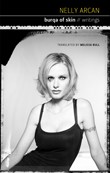I first heard the name Nelly Arcan the year I moved to Montreal. A friend of mine had just discovered her books and was enamoured as much with the writing as he was with the woman; or perhaps it was the intellectual body of the work he fell in love with – perhaps all three. More recently, reading essays and reviews on other books by Arcan, I have found it frustrating to discover that it seems impossible to write about her prose without first writing about her body. Even Nancy Huston’s preface, which also appears in the original French (Seuil, 2011), although characterizing Arcan as a philosopher akin to Schopenhauer, cannot do away with Arcan “the beautiful young woman,” Arcan “the prostitute.”

Burqa of Skin
Nelly Arcan
Translated by Melissa Bull
Anvil Press
$18.00
paper
121pp
9781772140019
More than just a blurring of fact and fiction, cumulatively the writings in Burqa of Skin also begin to haunt one another. For instance, the section entitled “The Dress” is echoed in the later “Shame.” The latter recounts the humiliation Arcan endured while a guest on the popular TV show Tout le monde en parle in 2007, while the first treats shame in more philosophical terms, beginning with a shameful childhood photograph: “My very being is indistinguishable from my shame. My clothes, the pictures on my walls, my photo albums, they’re all wound into it but don’t bear the brunt of its weight. Some things can’t be delegated.” Arcan is also self-reflexive: “I know how tiny my problems are on a world scale. Their smallness is part of my shame.”
Sometimes the weight of despair overcomes Arcan’s wit. It moves like a spin-top about to topple over: “my voracity has never had anything to do with hunger, my voracity was always that of a child who tries to kill themselves by swallowing anything they can grab; I got a taste for it by being hungry.” However, there is another side to the charged character of Arcan’s writing, and that is the highly lyrical and critical nature of her ideas. Even when articulated from a place of profound despair, there is rarely an occasion in which Arcan’s writing is not also smart and analytical. In a fragment entitled “The Negligée,” she writes, “you can recognize a country’s wealth by the education of its whores. The fatter a people, the more degrees its whores have. The fatter the population, the more expensive the whore; the less she works.” What impresses is Arcan’s versatility and command over so many registers and styles – not to mention Melissa Bull’s ability to relay them, in her English translation, with what can only be described as a mixture of love and ease.






0 Comments